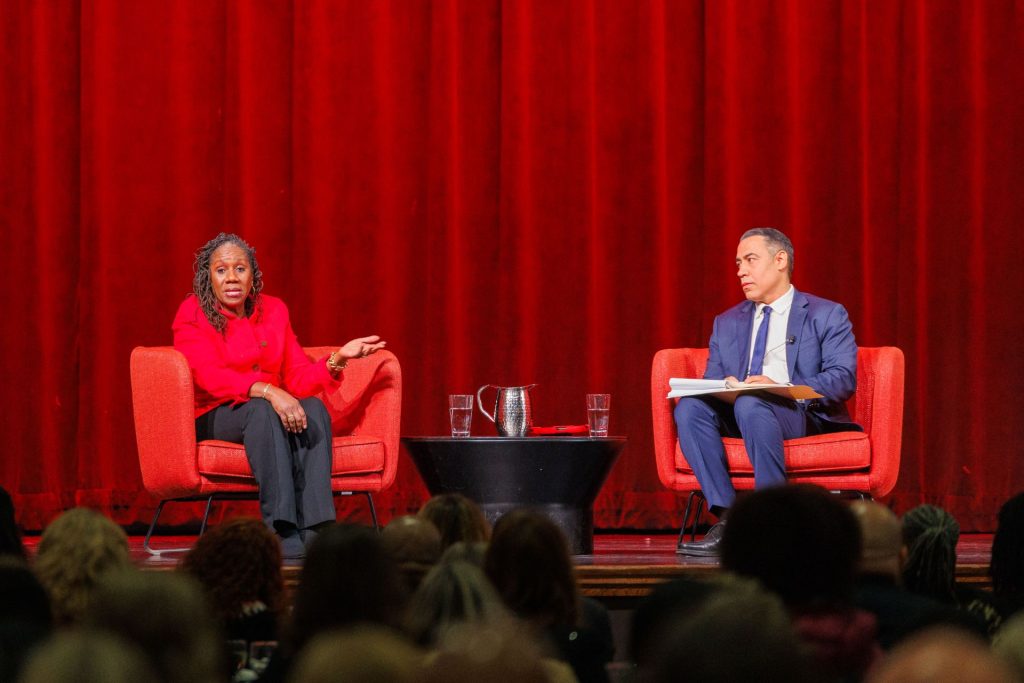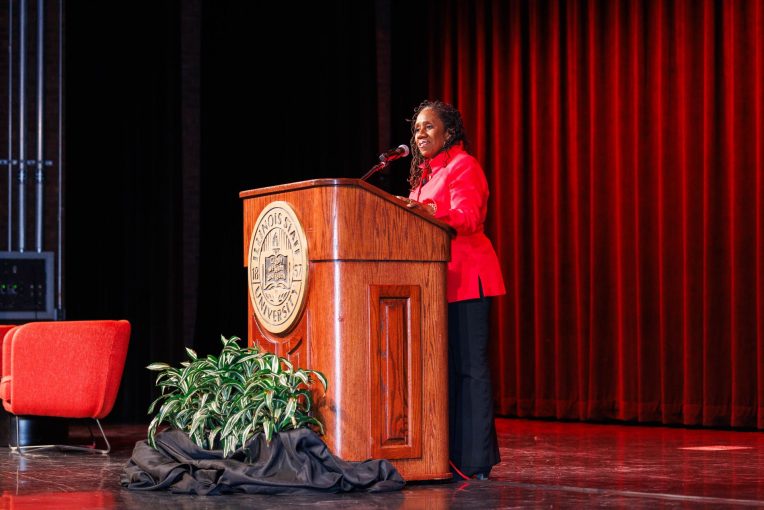The U.S. is facing a democratic crisis, according to civil rights lawyer and scholar Sherrilyn Ifill.
She shared her dire concerns, with hope for the future, Friday, January 26, during the sold-out Martin Luther King Jr. Cultural Dinner in the Bone Student Center’s Brown Ballroom.
As an attorney for the NAACP Legal Defense and Educational Fund, Inc. (LDF) beginning in 1988, Ifill has litigated voting rights cases for the past three decades. During that time, she said there’s been an alarming increase in voter suppression that disproportionately impacts voters of color.
“One of the phenomena that we have seen is the way in which the concept of voter suppression, which used to be limited regionally, has now metastasized and become a nationwide issue,” Ifill told the crowd of nearly 650. “That is largely a result of the Supreme Court’s decision in 2013 in Shelby County v. Holder when they essentially gutted a critical part of the Voting Rights Act that we use to protect against voter suppression.”
As an example of several voting laws proposed or passed by state legislatures following the 2020 election, Ifill pointed to legislation passed by Georgia State Legislatures in 2021, challenged by LDF, which included provisions banning “line relief” (when volunteers provide water and snacks to people waiting in long lines to vote), requiring additional identification for requesting and casting an absentee ballot, and restricting the use of secure ballot drop boxes, among other provisions.
“The question now that we see (the cracks and fissures in the foundation of our democracy) is, what are we going to do?”
Sherrilyn Ifill
This legislation followed the 2020 presidential election that saw a 25% increase in Black voter registration as more than 5 million Georgians voted amid the COVID-19 pandemic, many standing in long lines to cast their ballots.
Ifill, who served as the president and director-counsel of the LDF from 2013-22, applauds voters’ “incredible passion” and “resilience” and challenges the idea that restrictive voting laws are necessary to combat voter fraud.
“Our elections are incredibly secure and are not characterized by fraud,” Ifill said. “The idea of voter fraud is a tactic that has been used for decades to frighten and intimidate people from voting.”
Although voter suppression has been a continuous issue in the U.S. according to Ifill, she is particularly alarmed by “the cracks and fissures in the foundation” of our democracy that she’s seen exposed in recent years.

“(Our political system) was already flawed,” Ifill said. “(It) doesn’t work to give people a real voice because (we) already allow racial and partisan gerrymanders to happen. (We) already allow a system in the Senate where one person can hold up legislation—as the filibuster did for civil rights legislation for most of the 20th century. Why are we only now talking about an ethics code for the Supreme Court? That was the system we complacently allowed to go on.
“The question now that we see (the cracks and fissures in the foundation of our democracy) is, what are we going to do?”
Despite feeling ashamed that, despite her best efforts, she’s passing along to her kids a world seemingly worse than the one handed to her, Ifill remains optimistic about the future.
“When things start to unravel, it opens up people’s minds to think, ‘What else should we be doing differently?’” Ifill said. “I think if we calibrate it just right, this may also be the moment of greatest opportunity to make real transformative change.”
Ifill said some of the changes she thinks are necessary to improve the health of our democracy include: addressing (and limiting) money in politics, particularly in judicial elections; revising Senate filibuster rules; reexamining the electoral college; and codifying previous “norms” for political leaders.
“Now we know that we need to firm up these weak places where we left space for people to overrun the system,” Ifill said. “I think that’s what we’ve been experiencing.”

Reflecting on Dr. Martin Luther King’s legacy, Ifill said she’s confident that King would give us “permission to dream something better for our country.”
“The question for us,” Ifill said, “is what are we dreaming?”
Now a distinguished professor of practice at Harvard Law School, Ifill is continuing her civil rights and democracy work as a Ford Foundation fellow at the Museum of Modern Art (MOMA), leading a project focused on exploring the values of the 14th Amendment.
“I think the work ahead of us is great indeed,” Ifill said. “The part that makes me feel optimistic—and I’m always optimistic about this country—is the part in this crisis that sees an opportunity, to think differently and to build the world that we actually want. I believe we are being called to a higher level of citizenship than we have ever practiced before, and the only question is, are we willing to take it on?”
The Martin Luther King Jr. Cultural Dinner was presented by the Office of the President, University Housing Services, the Office of Equity and Inclusion, and Association of Residence Halls, and the Black Student Union. Ahead of Friday’s dinner, Ifill met with student representatives from the Black Student Union, the Student Government Association, and the Association of Residence Halls.


